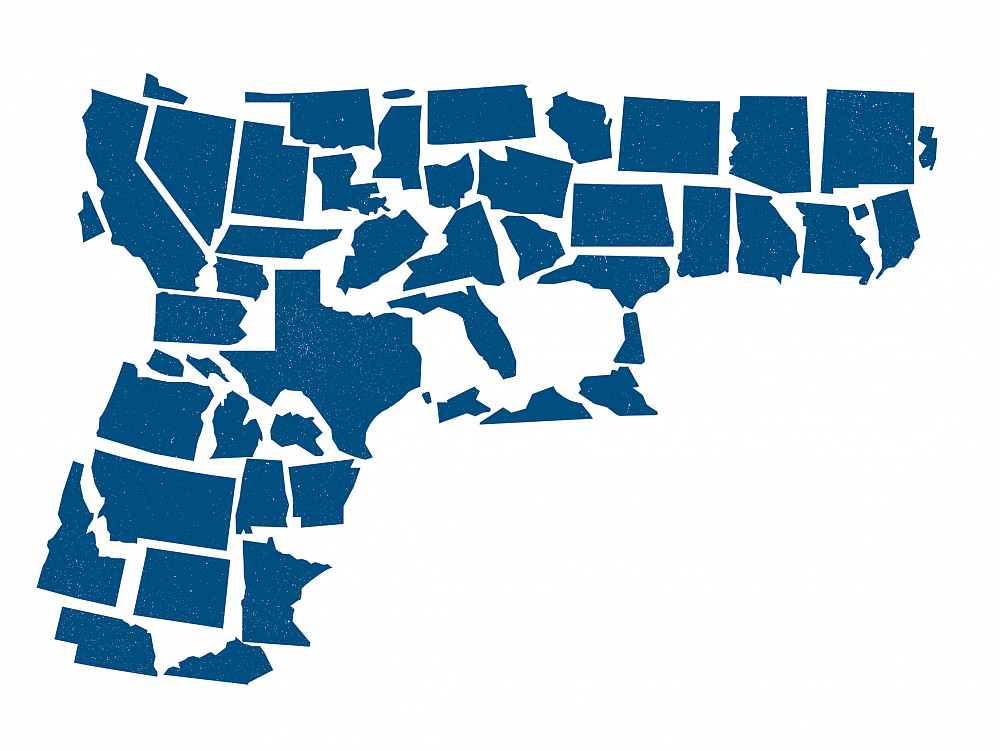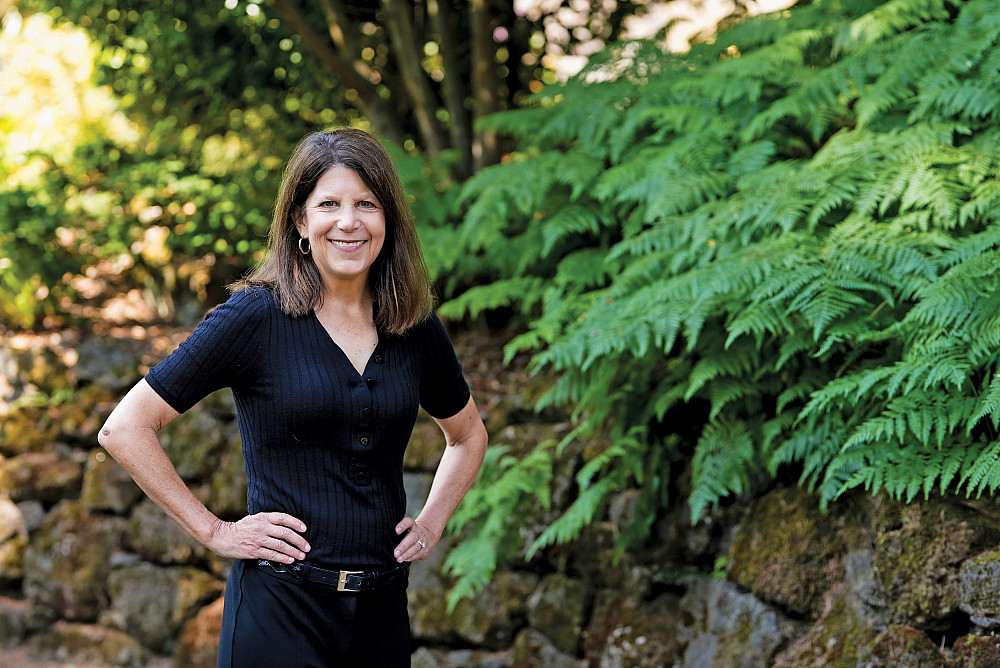main content What Does It Mean to Be a Liberal Gun Owner?
Professor Jennifer Hubbert examines how liberals define democracy and citizenship through owning guns.

By Shelly Meyer
Illustration by Rob Dobi
Learning how to shoot a handgun at a Las Vegas gun convention had never been on Jennifer Hubbert’s bucket list. But last fall, the professor of anthropology and Asian studies found herself doing just that. ¶ “As anthropologists, we engage with people in their activities in what we call ‘participant observation,’ ” Hubbert explains. “For me, this has meant learning how to shoot a gun for the first time, going to gun club book groups, and attending a national gun owners’ meeting in Las Vegas.” ¶ All of these activities are in service to Hubbert’s larger research question: “What does it mean to be a liberal gun owner in the United States?”
A New Research Target
Over the years, Jennifer Hubbert has focused her scholarship on what is often called the “anthropology of the state,” particularly as it pertains to state-citizen relations in China. But she’s found it increasingly difficult to study there given the current political climate.
Hubbert felt the need to pivot.
“Essentially, I had an NPR moment,” Hubbert recounts. “I heard a story on NPR about the uptick in gun ownership among women, people of color, the LGBTQ+ community, and liberals. I became particularly interested in why gun ownership is increasing among liberals.”
Hubbert knew that most gun ownership research focuses on conservative white men. With the rise in gun ownership among liberals, she saw an opportunity to explore the politics of gun ownership and advance a more nuanced discussion. Hubbert has devoted the last two years to studying the topic, including her sabbatical year of 2022–23.
“I’m still pursuing my interest in the nation and citizenship, but I’m shifting the focus to examine gun culture in the United States,” she says. “I’m seeking to understand what gun ownership means to liberals and how they envision norms of citizenship and the construction of a just world through gun ownership.”
Liberal gun ownership has long been a blind spot in academic research, particularly in the discipline of anthropology. Most studies come out of an epidemiological or criminological perspective––in other words, what happens after a gun has been put to use. Given this landscape, Hubbert had reservations about how her research would be received by peers in her field, who tend to be left leaning and hold a negative view of guns. So far, she has been pleased with the response and high level of interest.
“There’s a growing sociological perspective that’s focused on gun culture, but most of it is about the stereotypical gun owner: a white conservative male,” Hubbert says. “I’m among the rare few in my field looking at liberal gun culture.”
The shifting demographics of gun ownership in the United States mean interest in the topic is unlikely to wane anytime soon. According to a recent poll from NBC News, 41 percent of registered Democrats live in a household with a gun, representing a sharp increase from 33 percent in 2019. The Harvard T.H. Chan School of Public Health found that women accounted for about half of all gun purchases between 2019 and 2021, and that new gun owners are more likely to be women than men.
Hubbert has been closely watching these trends, as well as the growth of the National African American Gun Association, which has jumped to more than 45,000 members since its founding in 2015. Other organizations are also experiencing rapid growth, including the LGBTQ+-focused Pink Pistols and the Latino Rifle Association.
According to an NBC News poll, 41 percent of registered Democrats live in a household with a gun, up from 33 percent in 2019.
A Variety of Research Angles
Hubbert kicked off her gun ownership research in summer 2022 with a grant from the undergraduate dean’s office. Since then, she’s been awarded a $75,000 grant from the National Endowment for the Humanities to continue her exploration of gun culture in the United States. The NEH support gives Hubbert the time and resources to advance her research in new ways, including working with a research assistant, conducting ethnographic fieldwork, drafting a book manuscript, and presenting her findings at professional meetings.
At this point, Hubbert has interviewed about 50 nontraditional gun owners, most of whom live in Oregon and Washington. Through Zoom and travel, she has extended this reach to Texas, Maryland, Virginia, and California, among other states. Her goal is to interview another 50 in order to form a robust picture of the group.
Hannah Eaton BA ’23, JD ’26, who majored in sociology and anthropology as an undergraduate, served as Hubbert’s first research assistant. She is now a student at Lewis & Clark Law School. Eaton met Hubbert during her earliest days at Lewis & Clark; she had transferred to L&C after completing a year of community college and was assigned Hubbert as her advisor.
“When I met with Professor Hubbert, I immediately knew that I wanted to take one of her courses. I went on to register for one of her classes every semester I was able to,” says Eaton. “When she asked me if I would be interested in conducting research with her over the summer of my junior year, I was ecstatic!”

Hubbert and Eaton collected information from liberal gun owners on Reddit, an online discussion platform. The pair analyzed two “megathreads” on the website that corresponded with periods of increased gun ownership: the contentious presidential election of 2020 and the elementary school shooting in Uvalde, Texas, in 2022. Each megathread included around 1,000 comments to sift through.
The preliminary online research looked at the values of citizenship among liberal gun owners, assessing public comments to better understand how they define rights and responsibilities. Hubbert found that some associated their gun ownership with liberal politics that prioritize the collective over the individual and demand an accountable government. She began referring to this value system as an “emancipatory democracy.”
Last year, Hubbert expanded the project beyond the digital space to interview people in real life. One of her research papers examines the National Rifle Association’s much-quoted claim, “The only thing that stops a bad guy with a gun is a good guy with a gun.” Hubbert is interested in how these conceptions of “bad guys” and “good guys” are interpreted among liberal gun owners under a broader “anthropology of morality.”
In 2023, Olivia Spagnuolo BA ’24, a mathematics major, became Hubbert’s second research assistant. Spagnuolo applies their data-coding skills to organize Hubbert’s interviews. Spagnuolo’s work helps Hubbert review and easily assess how her subjects feel about the importance of the U.S. Constitution’s Second Amendment, another aspect of her research.
“It’s been interesting to be involved in the middle stages of a project and learn how to read, process, and synthesize large amounts of qualitative data,” Spagnuolo says. “This is the nitty-gritty, behind-the-scenes work. I’m seeing for the first time how researchers decide what to include in articles and what counts as worthy of analysis.”
This summer, Hubbert will be presenting her next paper at a conference in Barcelona, Spain. The paper focuses on the “theorization of fun.” Through her fieldwork, Hubbert noted the significance of the joy that shooting guns brings to some people, which can go unrecognized among researchers who focus on the political beliefs of gun owners. “For many, it’s seen as a zen-like activity,” she says. “It’s viewed as a skill to master or a zone to enter where all of your worries leave your head. I’m asking, ‘How do we give credence to that?’ ”
Liberal Gun Ownership as Advocacy
While Hubbert has identified commonalities among liberal gun owners, she’s also uncovered significant ideological differences within the group, particularly when it comes to the matter of gun rights––who should be allowed to bear arms and under what conditions. “It’s such a broad spectrum of opinions,” Hubbert says. “There are people who would give up their guns in a heartbeat if it indicated a reduction in gun violence. There are also strong supporters of gun ownership as a constitutional right.”
Hubbert is finding that liberal gun owners often want to address the root causes of gun violence, not just the creation of gun control legislation. They recognize the need for an investment in mental health funding, education funding, and job creation to help address the issues of structural inequality that frequently underlie gun violence.
In addition, Hubbert has discovered that many liberals from historically marginalized groups are purchasing guns in order to feel safe. These individuals are unnerved by a political climate that has led to an increase in racist, sexist, and transphobic attacks.
“To many liberals, gun ownership is a form of advocacy,” says Hubbert. “I hope my research will be able to address some really contentious politics from a new angle.”
More L&C Magazine Stories
L&C Magazine is located in McAfee on the Undergraduate Campus.
MSC: 19
email magazine@lclark.edu
voice 503-768-7970
fax 503-768-7969
The L&C Magazine staff welcomes letters and emails from readers about topics covered in the magazine. Correspondence must include your name and location and may be edited.
L&C Magazine
Lewis & Clark
615 S. Palatine Hill Road
Portland OR 97219

